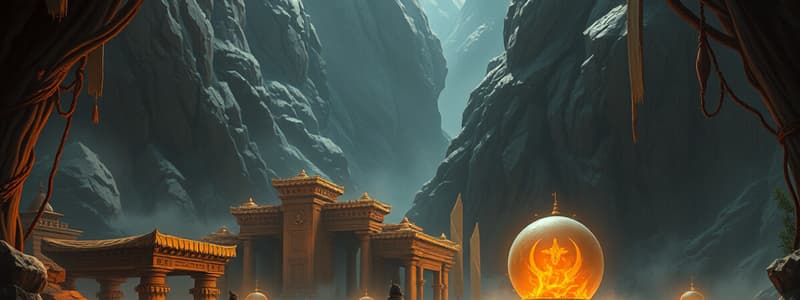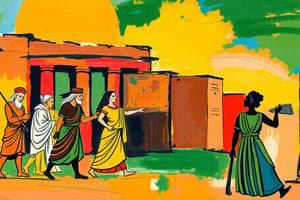Podcast
Questions and Answers
What are the banks of rivers known for in ancient civilizations?
What are the banks of rivers known for in ancient civilizations?
Supply of drinking water and land fertile for growing crops.
Which of the following individuals is known for their contributions to ancient science?
Which of the following individuals is known for their contributions to ancient science?
- Thales (correct)
- Francis Bacon
- Galileo Galilei
- Johan Kepler
What significant event occurred in 1927?
What significant event occurred in 1927?
- The first landing on the moon
- The invention of a way to record sound waves on motion-picture film (correct)
- The beginning of the Galleon Trade
- The launch of Sputnik
Which of the following acts was designed to protect the environment in the Philippines?
Which of the following acts was designed to protect the environment in the Philippines?
Who conducted notable research on sea snail venom?
Who conducted notable research on sea snail venom?
What did Francis Bacon contribute to?
What did Francis Bacon contribute to?
______ launched Sputnik in 1957.
______ launched Sputnik in 1957.
Galileo Galilei was known for developing the telescope.
Galileo Galilei was known for developing the telescope.
Who conducted research on tilapia culture?
Who conducted research on tilapia culture?
Study Notes
Introduction
- Overview of significant periods in history and key contributions to science, technology, and culture.
4 Periods of History
- Divides historical development into four distinct eras, each marked by unique advancements and cultural shifts.
Ancient Civilization
- Recognized for reliance on riverbanks providing drinking water and fertile land for agriculture.
Ancient Mesopotamia
- A cradle of civilization known for developments in writing, law, and urban planning.
Ancient Egypt
- Renowned for its monumental architecture, such as pyramids, and contributions to mathematics and medicine.
Ancient India
- Significant for advancements in mathematics (like the concept of zero) and contributions to philosophy and art.
Ancient China
- Important for inventions and innovations including paper, the compass, and gunpowder.
Inventions by Ancient Chinese
- Contributions such as papermaking, printing, and the compass dramatically influenced various fields and cultures.
Development of Science in Ancient Culture
- Early thinkers laid the foundation of scientific inquiry and rational thought.
Key Figures
- Thales: Considered the first philosopher; proposed that water is the essential substance of all matter.
- Pythagoras: Known for contributions to mathematics, particularly the Pythagorean theorem.
- Plato: Emphasized the role of forms and ideas in understanding the material world.
- Aristotle: Laid the groundwork for multiple disciplines including biology, ethics, and logic.
- Hippocrates: Established ethics in medicine, often referred to as the "Father of Medicine."
- Euclid: Made significant contributions to geometry, particularly through his work 'Elements.'
- Archimedes: Pioneered areas in mathematics and physics, notable for principles of lever and buoyancy.
Historical Progression of Science and Technology
- Examines the evolution of technology and its direct support across various areas.
Areas of Direct Support by Technology
- Enhancements in agriculture, architecture, engineering, and communication technologies shaped societies.
Key Dates
- 1927: Introduction of sound recording on films revolutionized the film industry.
- 1945: Significant post-war technological advancements.
- 1957: Launch of Sputnik by the Soviet Union marked the beginning of the space age.
- 1969: First manned moon landing symbolized major progress in space exploration.
Science, Technology, and Nation Building
- Examines the role of science and technology in national development, with a focus on the Philippines.
National Scientists of the Philippines
- Recognized individuals who made impactful contributions across various scientific disciplines.
Historical Context
- Explores scientific advancements before and during Spanish colonization, highlighting exchanges of knowledge.
Legislative Framework
- Philippine Clean Air Act of 1999: Aims to protect the environment and promote sustainable development.
- Electronic Commerce Act of 2000: Establishes regulations for internet-based commerce and combats cybercrime.
Areas of Research and Notable Filipino Scientists
- Promotes diverse fields of research including agriculture, marine science, and biotechnology.
Important Figures in Philippine Science
- Ramon Cabanos Barba: Known for mango tissue culture research.
- Lourdes Jansuy Cruz: Researched sea snail venom.
- Fabian Millar Dayrit: Work in herbal medicine.
- Rafael Dineros Guerrero III: Focused on tilapia culture.
- Enrique Mapua: Developed meconium drug testing methods.
- Lilian Formalejo Paten: Conducted research in plant biotechnology.
- Gregory Ligot Tangonan: Noted for contributions in communications technology.
- Caesar A. Saloma: Renowned physicist.
- Edwardo Gomez & Angel Alcala: Specialized in marine sciences.
Studying That Suits You
Use AI to generate personalized quizzes and flashcards to suit your learning preferences.
Related Documents
Description
This quiz explores the four main periods of history, focusing primarily on ancient civilizations. Delve into the unique attributes, innovations, and cultural legacies of ancient Mesopotamia, Egypt, India, and China. Test your knowledge on the remarkable inventions of ancient Chinese civilization as well.




